

Goodbye Holocene epoch - now we must gear up for the Anthropocene. Geologists rarely make headlines.

But this month the word ‘Anthropocene’ flooded the media following an intervention by scientists at the International Geological Congress in Cape Town. Since 2009, they have been poring over the evidence to work out whether the Earth has slipped abruptly and unexpectedly into a new geological epoch. They reached a startling conclusion: Earth has left the cosy confines of the epoch we humans know, love and absolutely depend upon – the Holocene. This was as profound an observation as two of science’s most significant discoveries – Copernican heliocentricity and or Darwin’s evolution. Like them, the coming of the Anthropocene demands we rethink our world view. The Holocene has been good for us. Unfortunately, this stability can no longer be relied upon. But are they ringing elsewhere? Antarctica’s Sea Ice Shrinks to New Record Low. Sea ice in Antarctica has hit a worrisome milestone, reaching its lowest recorded extent this week, according to data from the U.S.

National Snow and Ice Data Center. The daily ice area recorded on Tuesday represents an all-time low: 2.25 million square kilometers (872,204 square miles). While Arctic sea ice has shown a relatively steady decline in square mileage over the past three decades as global temperatures rise (see for yourself), its southern counterpart has yielded more erratic and controversial data since monitoring began in the late 1970s.
The February 14 mark for Antarctic sea ice surpasses lows seen around this time in 1997. In 2012, Antarctic sea ice actually hit a record monthly high, with scientists theorizing that melting ice shelves were contributing to the growth. Melting ice at the Earth’s poles is yet another indicator of global warming and causes concern about attendant sea-level rise and other climate impacts. U.S. Conservatives Unveil Plan to Fight Climate Change. In an effort to address the threat of climate change, a group of conservative U.S. statesmen has outlined a plan that, by 2030, could cut the United States’s carbon emissions by up to two-fifths below 2005 levels.

At a Wednesday press conference, the newly established “Climate Leadership Council”— a consortium of Republican Party stalwarts including officials from the Reagan and both Bush administrations—unveiled their plan for a gradually increasing, revenue-neutral tax that puts a price on carbon dioxide emissions. The Climate Leadership Council’s proposal calls for a $40 tax on each metric ton of carbon dioxide emissions, with the tax steadily increasing on an annual basis. All proceeds—an estimated $200 to $300 billion per year—would be distributed back to American citizens in the form of dividend checks. Carbon taxes on foreign imports and rebates for U.S. exports would then keep U.S. Arctic Ice Isn't Doomed Yet—Here's How to Save It. During the long, sunless Arctic winter, temperatures normally plunge far below zero; sea ice thickens and spreads.

But throughout most of 2016, conditions in the Arctic were anything but normal. In mid-November, a month before the full onset of winter, arctic sea ice actually began to melt—more than 19,000 square miles of ice disappeared, a loss on a scale never before seen so late in the year. At the end of December, air temperatures near the North Pole spiked close to the freezing point, about 50 degrees Fahrenheit above normal. “I started doing Arctic climate work back in 1982 as a young graduate student,” says Mark Serreze, the director of the National Snow and Ice Data Center in Boulder, Colorado. “So I’ve been looking at the Arctic for a long time, and I have never seen anything like this.” What do these extreme conditions mean for the future? Greenhouse gases: Everything you need to know. When hearing the words “greenhouse gas,” most people think immediately of carbon dioxide.
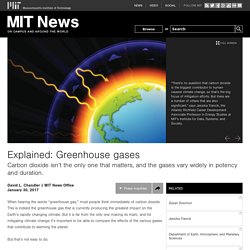
This is indeed the greenhouse gas that is currently producing the greatest impact on the Earth’s rapidly changing climate. But it is far from the only one making its mark, and for mitigating climate change it’s important to be able to compare the effects of the various gases that contribute to warming the planet. But that’s not easy to do. Greenhouse gases vary in not only their sources and the measures needed to control them, but also in how intensely they trap solar heat, how long they last once they’re in the atmosphere, and how they react with other gases and ultimately get flushed out of the air.
The differences make it impossible to do the very thing researchers and policymakers want most to do: come up with a simple conversion factor to allow exact comparisons among them. Floods and erosion are ruining Britain’s most significant sites. Climate change is already wrecking some of Britain’s most significant sites, from Wordsworth’s gardens in Cumbria to the white cliffs on England’s south coast, according to a new report.
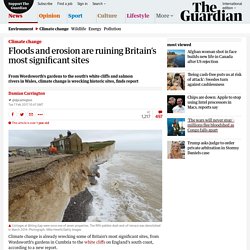
Floods and erosion are damaging historic places, while warmer temperatures are seeing salmon vanishing from famous rivers and birds no longer visiting important wetlands. Southern Africa cries for help as El Niño and climate change savage maize harvest. Two-year-old Zeka screams as a health worker measures the circumference of her arm while another holds her legs and presses her flesh.
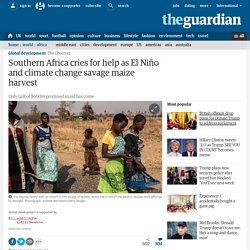
The nurses agree: Zeka has clear signs of edema, a swelling condition caused by extreme hunger. “She will live, but she needs to go to hospital. The situation in this area is much worse than when we were here just a few weeks ago. 11 Ways to See How Climate Change Is Imperiling the Arctic. While the average temperature of the planet is slowly creeping up, the Arctic is warming far more quickly—as much as two to three times faster.

On December 22, a weather buoy near the North Pole reported temperatures at the melting point of 32 degrees Fahrenheit. And recent research suggests that the average summer temperature in the region over the last century is higher than in any other century for at least 44,000 years. UK 'need not fear electricity blackouts' says ex-National Grid boss. Image copyright Getty Images The UK has enough energy capacity to meet demand - even on the coldest days when demand is highest, says Steve Holliday, the man who ran National Grid for a decade.
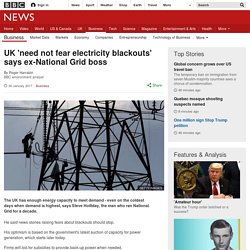
He said news stories raising fears about blackouts should stop. His optimism is based on the government's latest auction of capacity for power generation, which starts later today. Firms will bid for subsidies to provide back-up power when needed. The stand-by plants will run for a few days a year during extreme conditions. Much of the back-up will be provided by old gas and coal plants that would otherwise be scrapped.
Continuing Momentum for Putting a Price on Carbon Pollution. Mexico, which generated almost US$1b in revenue in 2014 through a carbon tax, announced it would build a national emissions registry, which with other policies will allow for the implementation of a national carbon market that could come into force in 2018.
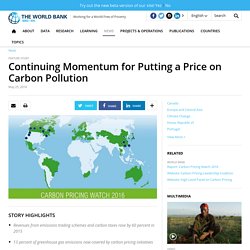
Canada is exploring options for carbon pricing on a national level. In 2015, governments raised about US$26b in revenues through carbon pricing mechanisms like emissions trading schemes and carbon taxes, representing 60 percent increase from 2014. The total value of such mechanisms is currently estimated at just below US$50b, according to Carbon Pricing Watch 2016. Historic opportunity to end poverty will be lost if we don’t tackle climate change. Over the past 15 years – and contrary to popular belief – the world has made tremendous progress in reducing global poverty.
One billion fewer people live in extreme poverty today than in 2000. This year, the rate of extreme global poverty is expected to fall below 10%, dropping into single digits for the first time in history. Inclusive economic growth, especially in China and India, has driven this success. This kind of economic growth, which increases the income of the poorest 40%, is critical to reaching our global goal of ending poverty by 2030.
Climate change explained in six graphics. The politics of climate change in the United States. Receding glaciers, volatile weather, and rapid greenhouse gas accumulation all point towards human-induced climate change. In fact, 97 percent of published reports agree that climate change is fuelled by man-made greenhouse gases. Hottest ever June marks 14th month of record-breaking temperatures. As the string of record-breaking global temperatures continues unabated, June 2016 marks the 14th consecutive month of record-breaking heat. According to two US agencies – Nasa and Noaa – June 2016 was 0.9C hotter than the average for the 20th century, and the hottest June in the record which goes back to 1880.
It broke the previous record, set in 2015, by 0.02C. The 14-month streak of record-breaking temperatures was the longest in the 137-year record. And it has been 40 years since the world saw a June that was below the 20th century average. The string of record-breaking monthly temperatures began in April 2015, and was pushed along by a powerful El Niño, where a splurge of warm water spreads across the Pacific Ocean. But the effects of El Niño have receded, and the effects of global warming are clear, said Nasa’s Gavin Schmidt. Bangladeshis take steps to reduce greenhouse gas emissions. Pacific islands nations consider world's first treaty to ban fossil fuels. The world’s first international treaty that bans or phases out fossil fuels is being considered by leaders of developing Pacific islands nations after a summit in the Solomon Islands this week.
The leaders of 14 countries agreed to consider a proposed Pacific climate treaty, which would bind signatories to targets for renewable energy and ban new or the expansion of coalmines, at the annual leaders’ summit of the Pacific Islands Development Forum (PIDF). Mahendra Kumar, climate change advisor to PIDF, told the Guardian the treaty proposal was received very positively by the national leaders. Hurricanes absorb carbon emissions. Hurricanes can be brutal, extreme releases of weather, and are often perceived negatively for their destructive power. But what if they were also a help? What if they were responsible for soaking up vast quantities of carbon dioxide?
Donald Trump would be world's only national leader to reject climate science. Donald Trump would be the only national leader in the world to dismiss the science of climate change should he become president, putting him out of step even with Syrian president Bashar al-Assad, Zimbabwe’s Robert Mugabe and Kim Jong-un, the leader of North Korea. UK poorly prepared for climate change impacts, government advisers warn. The UK is poorly prepared for the inevitable impacts of global warming in coming decades, including deadly annual heatwaves, water shortages and difficulties in producing food, according the government’s official advisers.
Climate change: Advisers warn of climate change domino effect. Image copyright PA. Global warming to blame for hundreds of heatwave deaths, scientists say. The great tide: is Britain really equipped to cope with global warming? On the day that London drowned, 16-year-old Shirley Orchard was serving customers bars of chocolate and packets of cigarettes at her father’s shop on Canvey Island. Human dynamics of climate change. Now we can all do climate modelling. The Global Calculator is a new online tool that lets anyone model future energy sources and carbon dioxide emissions, revealing potential ways to prevent a two-degree temperature rise. The final days of sub-400 ppm carbon dioxide. Decline of fishing in Lake Tanganyika 'due to warming' Image copyright Getty Images. FAO - News Article: Indigenous peoples central to efforts to combat climate change.
Maasai pastoralists, who participate in a farmer field school, are selling animals at a local market in Narok, Kenya. Indigenous peoples have a key role to play in addressing climate change. 21 July 2016, Rome - Governments must do much more to provide the enabling conditions required for indigenous peoples, local communities, smallholders and their organizations to restore degraded landscapes and achieve climate change mitigation and adaptation in practice, according to FAO. How can we talk about climate change? (Or can we?) Climate scientists make a bold prediction about sea level rise. Professor Brian Cox clashes with Australian climate sceptic. This is why we can't rely on trees to prevent global warming. Time to listen to the ice scientists about the Arctic death spiral.
Climate Change May Make Shellfish (and Us) Sick. Canada’s 'dirty oil' climate change dilemma. English Village Becomes Climate Leader by Quietly Cleaning Up Its Own Patch. Global warming and the race for the White House. Pressure grows on UK to ratify Paris climate change deal. Flooding of Coast, Caused by Global Warming, Has Already Begun. Unnatural Climates. Global warming is melting the Greenland Ice Sheet, fast. There is a third pole on earth, and it's melting quickly. Arctic Ocean shipping routes 'to open for months' Heating up the Games: Why the British Isles could be the only viable Olympic hosts. Obama on Climate Change: The Trends Are 'Terrifying' Which countries have ratified the Paris climate deal so far?
A new type of politics could help prevent climate disaster. Pump CO2 into rocks, report urges. Global trade deal threatens Paris climate goals, leaked documents show. 'Red tape' locking small island states out of billions in climate funds. #CNNZeDay: Help us go emission-free for a day! It's heating up: 'Unions can play a vital role in the battle for climate justice' Soil carbon storage not the climate change fix it was thought, research finds.
Why Obama Is Right on Clean Energy. India to ratify COP21 protocol on Gandhi's birthday - News from Al Jazeera. Ratifiying the Paris agreement will be a major step but must be the first of many. How Small Forests Can Help Save the Planet. New Data-Driven Planning Tool Helps Cities Advance Climate Action. Grass food crops facing climate change challenge. The world passes 400ppm carbon dioxide threshold. Permanently. EU move brings climate change treaty closer to reality. Scientists say 2014 was a turning point for climate change. And it’s all thanks to China. Paris climate deal: EU backs landmark agreement. Flights are getting bumpier. Here's why scientists are blaming climate change. Dr Kevin Newsham talks about a changing Arctic. Global economy could 'self-destruct' if world carries on burning fossil fuels, leading economist warns. Paris climate agreement: here's what world leaders have said. The green light. UK must focus on carbon removal to meet Paris goals, climate advisers urge.
UN moves to ban 'fastest growing' greenhouse gases. 'Extreme Weather' Film Connects Nature's Fury to Climate Change. How climate change triggers earthquakes, tsunamis and volcanoes. Global sea levels are rising fast, so where does that leave the cities most at risk? UN: Farming needs to harvest chance to cut emissions. Norway faces climate lawsuit over Arctic oil exploration plans. In a shock to no one, September was warmest such month on record. Shipping 'progressives' call for industry carbon emission cuts.
The Paris climate agreement is a game-changer – and business risks being left behind. The end of coal? Trump 'threat' to dominate UN climate negotiations. Climate Change Captured in Stunning Antarctic Ice Photos. Climate change at the Great Barrier Reef is intergenerational theft. That's why my son's in this story. Rise in atmospheric CO2 slowed by green vegetation. Japanese Monks Recorded the Climate for 700 Years. WMO: Five hottest years on record have occurred since 2011. Climate conflict: How to photograph climate change. Global carbon growth stalls as US coal continues to slump. The legal limbo of climate refugees. 'Global warming doesn’t care about the election': Nasa scientist warns Donald Trump over interference. Earth's plants are countering some of the effects of climate change. UK signs up for Paris climate agreement.
Climate change in pictures - News from Al Jazeera. The state of the climate in 2016. What does Africa need to tackle climate change? Another Giant Leap. Women. Work. Climate. by Climate Adaptation UNDP - Exposure. Sea ice in Arctic and Antarctic at record lows. Why Morocco is a leader of the 'green' world. Climate talks: 'Save us' from global warming, US urged. Climate changing 'too fast' for species. Trump to scrap Nasa climate research in crackdown on ‘politicized science’